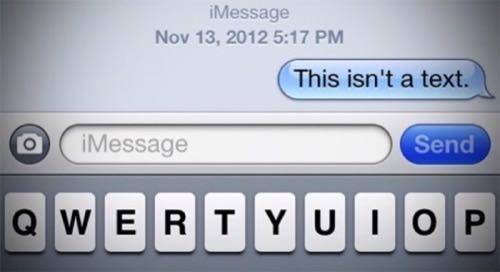
I was wondering when this was going to happen. As soon as Apple launched iOS 5 last year, many of us in the tech press took one look at its iMessage feature and thought the same thing: The carriers are screwed. This week, we saw the first sign that that prediction may be coming true.
For years, mobile carriers have gotten fat on phone-users desire to send each other short, text-based messages. Carriers are still getting a hefty chunk of revenue from texting, but this week they saw the first-ever decline in SMS text messaging, according to a new report by independent mobile analyst Chetan Sharma. In the third quarter of this year, the number of text messages people sent to one another in the U.S. dropped by about 2%.
That may not sound like much, but considering how fast texting had been growing – especially among young people – the fact that the number declined at all is significant.
It’s not that people are any less connected or firing off any fewer messages. They’re just doing it in different ways. One of the biggest culprits is indeed iMessage, which operates exactly as text messages do, but bypasses the carrier entirely for Apple to Apple communications. Another culprit is Facebook’s Messenger app. It turns Facebook’s desktop IM feature into a very SMS-like communication method, again without having to route messages through the mobile provider.
The Rise Of Texting Alternatives
I can totally see how this would be the case. Not long after iOS 5 launched, I personally found that a huge percentage of texts I was receiving were actually iMessages, something iOS designates using labels within its Messages app on the iPhone. It just so happened that enough of my friends and people I texted with on a regular basis were using iPhones, so our exchanges were converted into iMessages. It was enough to allow me to eliminate my ultimate texting plan for a cheaper option. Exactly what the carriers didn’t want.
Facebook Messenger wasn’t originally something I intended on using much, but enough of my friends were using Facebook’s mobile messaging feature that I soon found myself opening the app pretty regularly. Once again, this was one less thing I was using SMS texts for. To a lesser extent, other mobile chat apps like imo, Beejive and Skype also decrease our need to use traditional texts.
In the long run, Facebook Messenger’s cross-platform capabilities may actually give it a leg up on becoming the top texting alternative. Unlike iMessage, it’s cross-platform, running on iOS, Android and Blackberry. Apple’s messaging protocol spans its own devices – iPads, iPhones, iPods and with Mountain Lion, Mac computers. But Facebook’s approach is far more platform agnostic, extending browser-based instant messages to mobile devices and allowing those conversations to continue on without interruption, regardless of which mobile platform one is using.
Texting is still huge. It may be quite some time before we see it go away. And to be sure, carriers will be aggressively creative about finding new revenue streams if this one ever drops off. In the meantime, the range of texting alternatives that are available for smartphone can save real money for even the most avid texters.

















